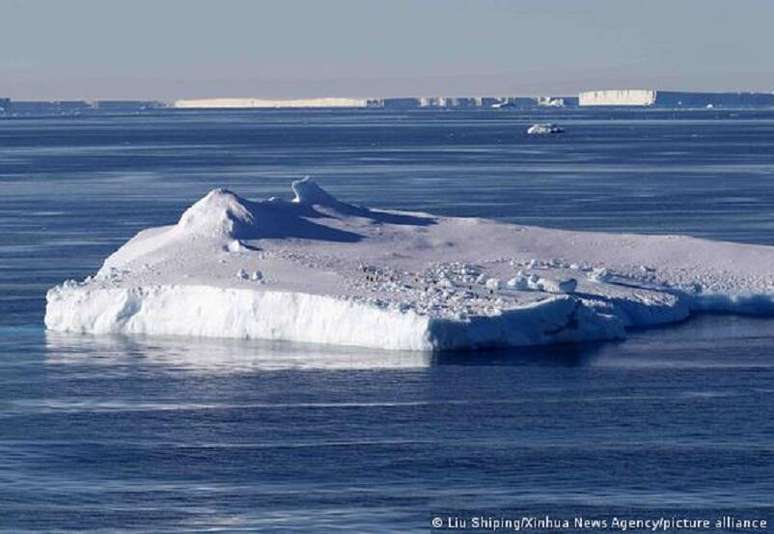According to scientists, the West Antarctic ice sheet will continue to melt this century even if global warming is stopped.
The acceleration of melting of the ice cap of West Antarctica this century, and the resulting rise in sea levels, is inevitable, according to a study by the British Antarctic Survey (BAS) research center published on Monday (23/10). However, this process could be slower if global warming does not exceed 1.5°C.
Published in the specialized journal Nature Climate Change, the study highlights that melting of the ice cap of West Antarctica It’s no longer a question of “if”, but “how fast”. The study’s authors, Kaitlin Naughten, Paul Holland and Jan De Rydt, used a supercomputer to simulate melt scenarios in the region.
West Antarctica represents only a tenth of the southern continent
(Photo: Liu Shiping-Xinhua News Agency-picture Alliance)
“Our main question was how much control do we still have over the melting of the ice shelf? How much further melting can be avoided if we reduce emissions? Unfortunately, the news is not good,” said oceanographer Naughten.
Sea level rise
Naughten’s study focused on the part of the West Antarctic Ice Sheet most at risk melting underneath, near the Amundsen Sea. Includes the huge Thwaites Ice Shelf, which is melting so rapidly that it has earned the nickname “Doomsday Glacier.” West Antarctica makes up only a tenth of the southern continent, but is more unstable than the larger eastern part.
The researchers found that even if global warming could be kept to a few tenths of a degree, it would have “limited power to prevent ocean warming that could lead to the collapse of the West Antarctic ice sheet.”
Even if temperatures increased by just 1.5°C above pre-industrial levels – the study’s best-case scenario – the the ice would still melt three times faster than in the last century.
Naughten’s team was the first to use computer simulations that verified the effects of hot water melting the underlying layeranalyzing four scenarios related to different amounts of carbon dioxide released into the atmosphere: in each case, they found that erosion would continue, meaning that the layer could collapse.
“Reducing emissions can help prevent the worst-case scenario of melting, but beyond that, mitigation has negligible impact,” Naughten said.
Naughten says to avoid the word “doomed” since it is still possible that emissions and even warming could theoretically be stopped or even reversed in the long term. “It’s not inevitable that we will lose everything because sea level rise is long-term. The study’s analysis goes out to 2100.”
OR Melting West Antarctic ice won’t just accelerate sea level rise It will also alter major ocean currents that regulate global climate and negatively impact East Antarctica, which stores 90% of the continent’s ice.
Turning point in the climate system
“Our data indicates this we have lost control over the dissolution of West Antarctica. To keep it in the same situation as decades ago, we would have had to act on climate change much more quickly,” Naughten stressed.
The study suggests that the change could take several hundred years to occur, but Naughten pointed to the ultimate speed of the transformation as a key factor. He said it would be “absolutely devastating” if it occurred over a few hundred years, but that humanity could adapt if the change could last a few thousand years.
He points out that the silver lining of the study is that predicting this situation in advance gives the world more time to adapt to sea level rise.
The researcher further said that the world must continue to work towards this goal reduce emissions that cause global warmingincluding dependence on fossil fuels, to prevent this melting from being further accelerated.
OR The collapse of the West Antarctic Ice Sheet was identified as one of nine climate system tipping points in 2009. At the time, scientists stressed that exceeding these environmental limits would be catastrophic for life on Earth and would cause irreversible changes in the climate.
In addition to this collapse, the reversal of ocean currents, the death of the Amazon and the melting of permafrost are part of this list.
Source: Terra
Rose James is a Gossipify movie and series reviewer known for her in-depth analysis and unique perspective on the latest releases. With a background in film studies, she provides engaging and informative reviews, and keeps readers up to date with industry trends and emerging talents.






